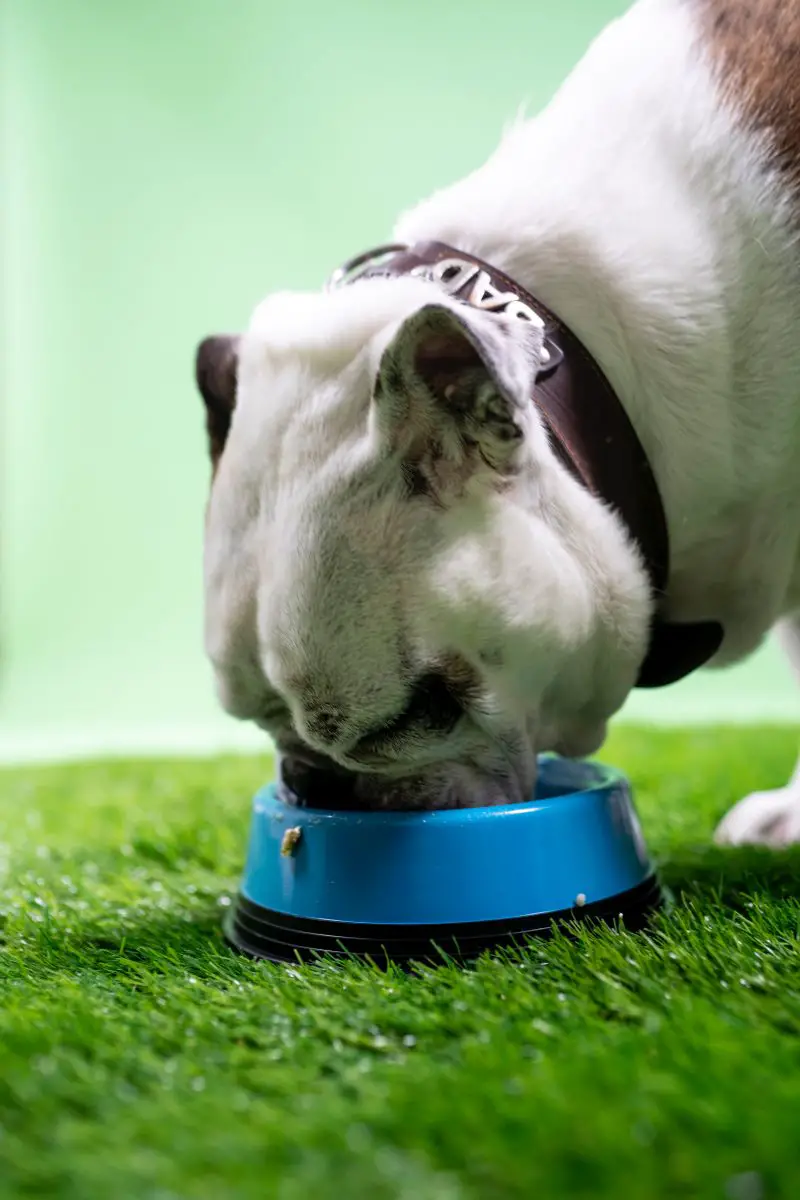Un essere umano medio impiega circa 6 ore per digerire completamente un pasto ma, ovviamente, questo numero può variare a seconda della singola persona. E lo stesso vale per i cani: un cane può impiegare dalle 4 alle 10 ore per digerire il cibo, con molti fattori che influenzano l'esatta quantità di tempo impiegato.

Indice
- Come fanno i cani a digerire il cibo?
- Fattori che influenzano la velocità di digestione nei cani
- Lo stress può influenzare la digestione
- Farmaci
- Come faccio a sapere se il mio cane sta lottando con la digestione?
- FAQ
Come fanno i cani a digerire il cibo?
Il sistema digestivo di un cane lo è relativamente simile a quello di un essere umano. La digestione inizia quando il cibo entra nella bocca e continua attraverso diversi organi per assorbire i nutrienti necessari che il corpo ha bisogno dal cibo. Il cibo rimanente, che non è utile all'organismo e classificato dall'apparato digerente come un rifiuto, viene quindi escreto. Tuttavia, per migliorare la nostra comprensione di questo processi, ecco una ripartizione più coesa delle fasi coinvolte nella digestione.
Uno – Bocca
Negli esseri umani, la digestione inizia nella bocca, dove gli enzimi presenti nella nostra saliva iniziano a lavorare per scomporre gli alimenti prima ancora che li deglutiamo. Tuttavia, questo non è lo stesso nei cani. La saliva del cane contiene enzimi, ma sono efficaci solo nell'accelerare la guarigione delle ferite, ecco perché i cani tendono a leccarsi le ferite. Invece di iniziare a scomporre il cibo, la saliva del cane agisce come un lubrificante, aiutando il cibo a scivolare comodamente lungo l'esofago per raggiungere lo stomaco. La digestione è aiutata anche dalla masticazione e nei cani masticare il cibo, soprattutto quello duro e secco, aiuta a rendere più facili i passaggi successivi per il resto del sistema digestivo.
Due – Stomaco
Lo stomaco è pieno di acido, che aiuta a dissolvere il cibo che arriva lì. I cani in particolare hanno uno stomaco molto acido per aiutarli a digerire alimenti come carne cruda e ossa. È nello stomaco che si trasforma il cibo chimo, una polpa semifluida di cibo parzialmente digerito. Lo stomaco di un cane contiene enzimi digestivi e anche questi aiutano a preparare il cibo per la fase successiva della digestione. Questa parte del processo può richiedere fino a otto ore per i cani, rispetto a una media di 30 minuti per gli esseri umani!
Tre – Intestino
Gli intestini sono una connessione di tubi attraverso i quali il chimo passa dove viene completamente digerito e scomposto. Il cibo passa prima attraverso l'intestino tenue e poi attraverso l'intestino crasso. Durante questo processo, tutti i nutrienti del cibo vengono assorbiti nel corpo per essere utilizzati per varie funzioni corporee. Il cibo rimanente è determinato dal corpo come rifiuto viene passato al colon. Qui, i rifiuti rimanenti diventano materia fecale e vengono immagazzinati fino a quando non sono pronti per essere espulsi dal corpo.
Fattori che influenzano la velocità di digestione nei cani
Come negli esseri umani, ci sono fattori che influenzano la velocità della digestione. Ci sono anche fattori che influenzano la velocità di digestione nei cani che non esistono per l'uomo. Inoltre, ci sono alcune cose che dipenderanno interamente dall'individualità del tuo cane.
Taglia e razza
Uno dei fattori più importanti che influenzano la velocità di digestione nei cani è la loro taglia. Influisce anche su quanto mangiano all'inizio e, quindi, su quanto cibo devono affrontare i rispettivi sistemi digestivi. Inoltre, la razza del cane influenzerà la sua grandezza. Un Labrador adulto può crescere fino a 12 volte più grande di un Chihuahua adulto, il che significa che il Labrador consumerà 12 volte la quantità di cibo che richiederà la digestione.
Età
L'età influisce anche sulla digestione nei cani, proprio come negli esseri umani. Allo stesso modo, per le persone, i cani più anziani hanno maggiori probabilità di lottare con la digestione e che il processo di digestione richieda più tempo. I cani più giovani generalmente digeriscono il cibo più velocemente e in modo più efficiente. Inoltre, i cani più sani digeriscono il cibo più velocemente e i cani più giovani tendono a trovare più facile mantenere la propria salute rispetto ai cani più anziani.
Dieta
Alimenti diversi vengono digeriti a velocità diverse. Il cibo secco richiederà molto più tempo per essere digerito rispetto al cibo umido e anche il cibo più ricco di proteine digerirà più velocemente. Anche la qualità del cibo fa la differenza: gli alimenti altamente trasformati tendono a richiedere più tempo per essere digeriti rispetto a quelli freschi e sani.
Lo stress può influenzare la digestione
Se il tuo cane è stressato, potrebbe avere difficoltà a digerire il cibo con la stessa efficacia dei cani non stressati. Lo stress nei cani può essere causato da molte cose, ma di solito è innescato da un cambiamento nel loro stile di vita o nell’ambiente. Se sospetti che il tuo cane sia stressato, è meglio portarlo dal veterinario. Il tuo veterinario sarà anche in grado di aiutarti se lo stress influisce negativamente sulla digestione del tuo cane.
Farmaci
Alcuni farmaci possono anche ostacolare la capacità del tuo cane di digerire il cibo in modo efficace. Se il tuo cane ha problemi di digestione da quando gli è stato somministrato un nuovo farmaco, allora potrebbe valere la pena consultare il veterinario. Il tuo veterinario dovrebbe essere in grado di consigliarti un farmaco diverso che non interferisca con la digestione del tuo cane o potrebbe consigliarti compresse o integratori per aiutare la digestione nei cani.
Come faccio a sapere se il mio cane sta lottando con la digestione?
Alcuni segni comuni di difficoltà di digestione nei cani includono quanto segue:
- Diarrea e/o vomito
- Perdita di appetito
- La stitichezza/lotta alla toilette
- Gas in eccesso
- Sangue o muco nelle feci
Se noti uno dei segni di cui sopra nel tuo cane, è importante assicurarti che sia visto da un veterinario che sarà in grado di consigliarti il miglior trattamento per il tuo amico peloso.

Quindi, quanto tempo impiega un cane a digerire il cibo? Nel complesso, la digestione del tuo cane dipenderà dalla sua razza, taglia, età e dieta. Se mantieni una dieta sana per il tuo cane e ti impegni per mantenerlo felice e in salute, non dovrebbe avere problemi a digerire il cibo in modo efficace.
Ma se il tuo cane sembra avere difficoltà con la digestione, il tuo veterinario sarà in grado di aiutarlo a tornare al suo solito aspetto.
FAQ
La durata per cui lo stomaco di un cane rimane pieno dopo aver mangiato può variare a seconda di diversi fattori, tra cui la taglia del cane, l'età, il metabolismo, il tipo di cibo consumato e i modelli digestivi individuali. In generale, i pasti piccoli durano 2-4 ore, mentre i pasti grandi durano circa 4-6 ore. Tieni presente che i singoli cani possono avere velocità di digestione diverse.
Molti cani impiegano dai 5 ai 15 minuti per finire il pasto. Questa è una gamma tipica per la maggior parte dei cani e suggerisce un ritmo alimentare sano.




